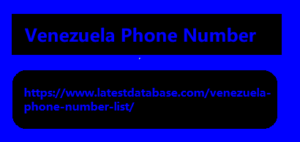Post by account_disabled on Mar 7, 2024 10:20:19 GMT
Outline your blog strategy 2. Identify the main topics of the blog 3. Expand your list of topics 4. Filter and group topics 5. Identify potential stocks 6. Prioritize topics based on goals If your business blog lacks organic visibility and barely registers track of your target audience, you will surely be looking for interesting topics to talk about to attract more visitors. Many online resources suggest finding blog post ideas in random and often useless ways, such as browsing social networks and analyzing user comments for conversation topics, sending out surveys, and even making use of blog idea generators. The main disadvantage of these methods is the lack of data demonstrating general public interest, which only leads to random intuitions.
Such a method cannot be the foundation of a successful blog. How do you Venezuela Phone Number know if the topics you choose are capable of attracting and engaging a significant portion of your target audience? One thing is for sure: finding topics to blog about requires strategy . We enter directly into the workflow for compiling a content plan for the company blog, immediately using a strategic and data-driven approach. How to find blog post ideas: 1. Outline your blog strategy 2. Identify the main topics of the blog 3. Expand your list of topics 4. Filter and group topics 5. Identify potential stocks 6. Prioritize topics based on goals 1. Outline your blog strategy Defining a strategy is essential. Here are the steps you will need to take to set one up for your blog.

If you already have an overall strategy with goals, personas, and objectives, you can go to step 2 and identify your key blog topics. Determine the purposes of your business blog This will help you set clear goals for all of your blog content. Ask yourself: Why do you need a blog? What area of your business are you trying to improve with your blog? What do you expect your audience to do after reading your content? Consider how your blog content will fit into your overall content strategy and, in turn, what type of content people expect to find depending on what stage of the buyer's journey they are in when they visit you. The purpose of your blog could be: Attract quality traffic; Generate leads; Drive conversions; Inform users about your product. Once you identify the stage and purpose of users on your site, you'll have a better understanding of which topics are right for your blog and which might be better for other pages on your site.
Such a method cannot be the foundation of a successful blog. How do you Venezuela Phone Number know if the topics you choose are capable of attracting and engaging a significant portion of your target audience? One thing is for sure: finding topics to blog about requires strategy . We enter directly into the workflow for compiling a content plan for the company blog, immediately using a strategic and data-driven approach. How to find blog post ideas: 1. Outline your blog strategy 2. Identify the main topics of the blog 3. Expand your list of topics 4. Filter and group topics 5. Identify potential stocks 6. Prioritize topics based on goals 1. Outline your blog strategy Defining a strategy is essential. Here are the steps you will need to take to set one up for your blog.

If you already have an overall strategy with goals, personas, and objectives, you can go to step 2 and identify your key blog topics. Determine the purposes of your business blog This will help you set clear goals for all of your blog content. Ask yourself: Why do you need a blog? What area of your business are you trying to improve with your blog? What do you expect your audience to do after reading your content? Consider how your blog content will fit into your overall content strategy and, in turn, what type of content people expect to find depending on what stage of the buyer's journey they are in when they visit you. The purpose of your blog could be: Attract quality traffic; Generate leads; Drive conversions; Inform users about your product. Once you identify the stage and purpose of users on your site, you'll have a better understanding of which topics are right for your blog and which might be better for other pages on your site.
